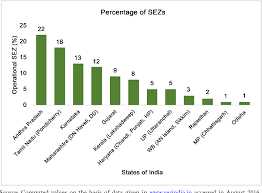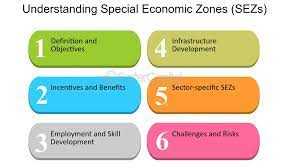What is a Special Economic Zone (SEZ)?
A Special Economic Zone (SEZ) is a designated area within a country that is subject to different economic regulations and policies compared to the rest of the country. SEZs are established with the aim of attracting foreign direct investment (FDI) and promoting economic growth.
SEZs offer various incentives and benefits to businesses that operate within their boundaries. These incentives may include tax breaks, simplified customs procedures, streamlined regulatory processes, and access to infrastructure and utilities. By creating a favorable business environment, SEZs aim to attract both domestic and foreign investors.
The establishment of SEZs can have several positive effects on the economy. They can stimulate industrialization, create employment opportunities, enhance technology transfer, and promote exports. Additionally, SEZs can help to diversify the economy by attracting investments in sectors that are strategically important for the country’s development.
SEZs are usually governed by a separate set of laws and regulations that are designed to facilitate business operations and provide a competitive advantage to companies operating within the zone. These regulations may include simplified labor laws, relaxed environmental regulations, and flexible land acquisition policies.
Overall, SEZs play a crucial role in attracting foreign direct investment and driving economic growth. By offering a business-friendly environment and a range of incentives, SEZs encourage companies to invest in the country and contribute to its development.
Definition and Purpose
A Special Economic Zone (SEZ) is a designated area within a country that is subject to unique economic regulations and incentives, aimed at attracting foreign direct investment (FDI) and promoting economic growth. The purpose of establishing SEZs is to create a favorable business environment that encourages both domestic and foreign companies to invest and operate within the zone.
SEZs are typically characterized by a set of specific regulations and policies that differ from the rest of the country. These regulations often include tax incentives, simplified customs procedures, streamlined bureaucratic processes, and relaxed labor laws. The primary goal of these measures is to reduce barriers to entry and provide a competitive advantage to businesses operating within the SEZ.
By creating a separate economic zone with unique regulations, governments aim to attract investment and stimulate economic development in areas that may have been previously underdeveloped or lacking in investment. SEZs often focus on specific industries or sectors, such as manufacturing, technology, or services, in order to leverage existing strengths or develop new areas of expertise.
The establishment of SEZs can have several benefits for both the host country and the investors. For the host country, SEZs can attract FDI, create employment opportunities, transfer technology and knowledge, and promote industrial diversification. For investors, SEZs offer a range of advantages, including tax benefits, access to a skilled workforce, streamlined administrative procedures, and proximity to suppliers and markets.
In summary, SEZs are designated areas within a country that offer unique economic regulations and incentives to attract foreign direct investment. These zones aim to create a favorable business environment, stimulate economic growth, and provide benefits for both the host country and the investors.
Key Features of SEZs
Special Economic Zones (SEZs) are designated areas within a country that offer special incentives and benefits to attract foreign direct investment (FDI). These zones are characterized by a set of key features that make them attractive for businesses:
1. Customs and Tax Benefits

SEZs typically offer customs and tax benefits to businesses operating within their boundaries. This includes exemptions from import and export duties, reduced or zero corporate taxes, and simplified customs procedures. These incentives help businesses reduce their operating costs and increase their profitability.
2. Infrastructure and Facilities
SEZs are developed with state-of-the-art infrastructure and facilities to support businesses. This includes well-planned industrial parks, modern transportation networks, reliable power supply, and advanced communication systems. The availability of such infrastructure makes it easier for businesses to set up and operate their operations in the SEZs.
3. Regulatory Ease
SEZs often have simplified regulatory frameworks and streamlined bureaucratic processes. This means that businesses operating within the SEZs can benefit from faster and more efficient procedures for obtaining permits, licenses, and approvals. The reduced bureaucratic burden helps businesses save time and resources, allowing them to focus on their core operations.
4. Access to Skilled Workforce
SEZs are often located in areas with a high concentration of skilled labor. This provides businesses with access to a talented workforce that can meet their specific needs. Additionally, SEZs often collaborate with local educational institutions to provide specialized training programs, further enhancing the availability of skilled labor.
5. Business-friendly Environment
SEZs create a business-friendly environment by implementing investor-friendly policies and regulations. This includes protection of intellectual property rights, transparent legal frameworks, and efficient dispute resolution mechanisms. The presence of such a supportive environment encourages businesses to invest in the SEZs and fosters long-term growth and sustainability.
6. Networking and Collaboration Opportunities
SEZs often attract a diverse range of businesses from various industries. This creates opportunities for networking, collaboration, and knowledge sharing among businesses. The presence of multiple companies in close proximity fosters innovation, promotes industry clusters, and enhances the overall competitiveness of the SEZ.
Overall, the key features of SEZs make them highly attractive for businesses seeking to expand their operations internationally. By offering a range of incentives and benefits, SEZs provide businesses with a competitive edge and facilitate their growth and success in the global marketplace.
Importance of SEZs for Foreign Direct Investment (FDI)
Special Economic Zones (SEZs) play a crucial role in attracting Foreign Direct Investment (FDI) to a country. These designated areas offer a range of incentives and benefits that make them attractive to both domestic and foreign investors.
One of the main reasons why SEZs are important for FDI is that they provide a favorable business environment. SEZs often have streamlined administrative procedures, simplified regulations, and a more business-friendly legal framework. This makes it easier for companies to set up and operate their businesses within the zone.
Additionally, SEZs offer various tax incentives and exemptions. These can include reduced or zero customs duties on imports and exports, lower corporate income tax rates, and exemptions from value-added tax (VAT) or goods and services tax (GST). These tax benefits can significantly reduce the cost of doing business and increase the profitability of companies operating within the zone.
SEZs also provide access to infrastructure and facilities that are specifically designed to support businesses. This can include well-developed transportation networks, modern industrial parks, reliable power supply, and advanced telecommunications infrastructure. These infrastructure advantages can help companies reduce their operational costs and improve their efficiency.
Furthermore, SEZs often offer a skilled and productive workforce. Many SEZs have vocational training centers and educational institutions nearby, which can provide a pool of qualified workers for businesses operating within the zone. This availability of skilled labor can be a significant advantage for companies looking to expand their operations or set up new ventures.
Attracting FDI through SEZs

Special Economic Zones (SEZs) play a crucial role in attracting Foreign Direct Investment (FDI) to a country. These designated areas offer a range of incentives and benefits to both domestic and foreign investors, making them highly attractive for businesses looking to expand their operations.
SEZs also offer tax incentives and exemptions to attract FDI. These can include tax holidays, reduced corporate tax rates, exemptions from customs duties and tariffs, and other fiscal benefits. These incentives significantly lower the cost of doing business for investors and increase their profitability.
Furthermore, SEZs often provide excellent infrastructure facilities, such as modern transportation networks, reliable power supply, and advanced telecommunications systems. These infrastructure advantages not only benefit the businesses operating within the SEZs but also enhance the overall competitiveness of the region, attracting more foreign investors.
Another key factor in attracting FDI through SEZs is the availability of a skilled and educated workforce. SEZs often have dedicated training centers and educational institutions that provide specialized training programs to meet the specific needs of the industries operating within the zone. This ensures that businesses have access to a skilled labor force, which is essential for their success.
Overall, SEZs offer a comprehensive package of incentives, infrastructure, and skilled labor, making them highly attractive for foreign investors. By establishing their operations within SEZs, businesses can benefit from a favorable business environment, tax incentives, excellent infrastructure, and access to a skilled workforce. This combination of factors significantly increases the likelihood of attracting FDI and driving economic growth in the host country.

Emily Bibb simplifies finance through bestselling books and articles, bridging complex concepts for everyday understanding. Engaging audiences via social media, she shares insights for financial success. Active in seminars and philanthropy, Bibb aims to create a more financially informed society, driven by her passion for empowering others.
